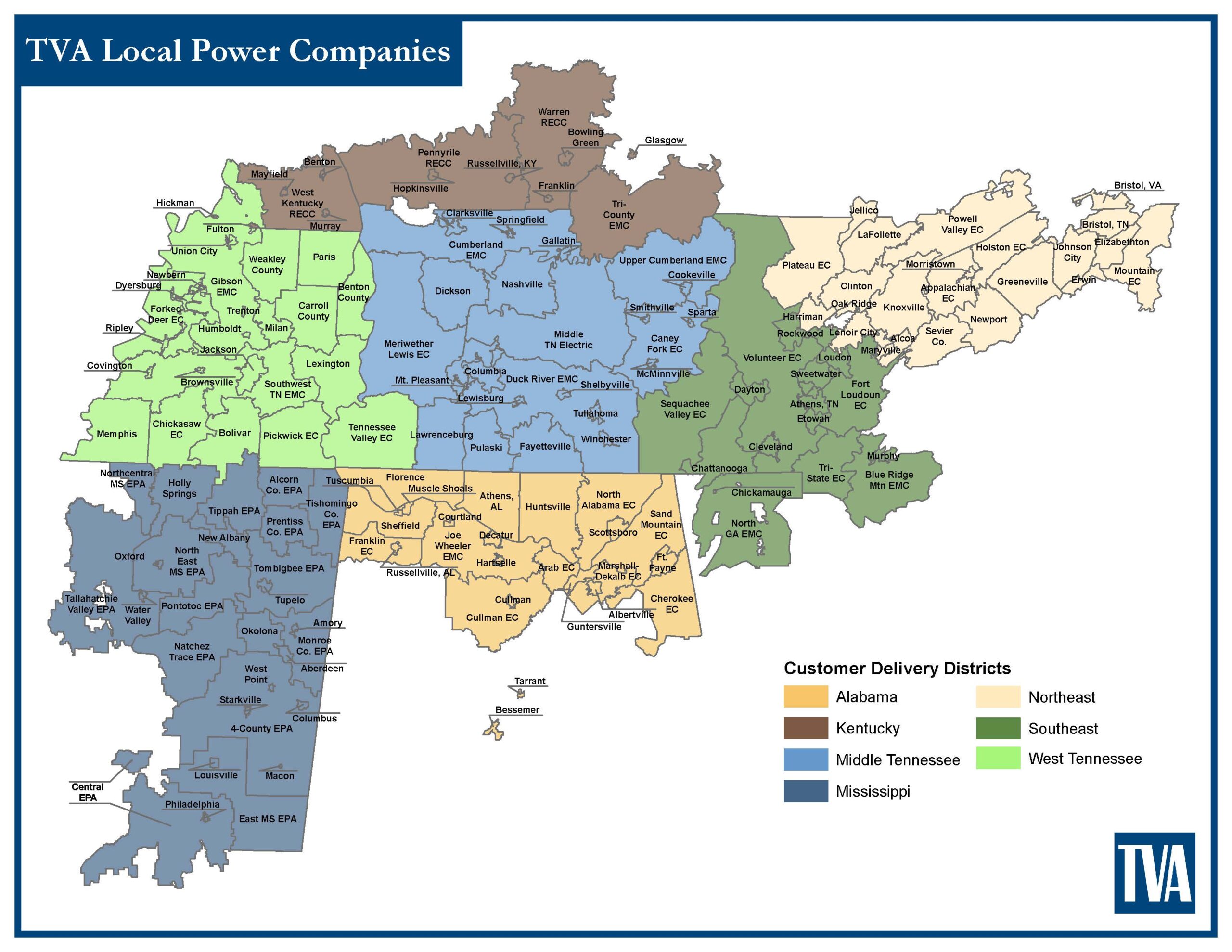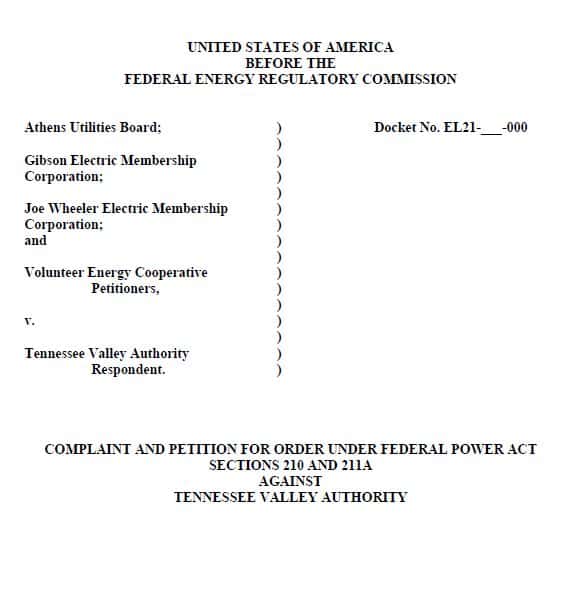On Monday, January 11, 2021, several LPCs filed a FPA complaint at FERC against TVA. Here we'll breakdown the alphabet soup and explain why this has the potential to fundamentally change the relationship between TVA and its customers.
Maggie Shober | January 15, 2021 | Alabama, Energy Policy, Tennessee, UtilitiesFour of the Tennessee Valley Authority (TVA)’s utility customers, called Local Power Companies or LPCs, filed a complaint with the Federal Energy Regulatory Commission (FERC) claiming that TVA is violating federal energy policy by not allowing them access to TVA’s transmission system to purchase cheaper power from a supplier other than TVA. (Docket #EL21-40)
The possibility of LPCs buying energy from sources other than TVA could have significant benefits for ratepayers: as has been demonstrated by Memphis’ utility, customers could save billions of dollars and transition to cleaner, less risky energy supplies if allowed to buy from third parties.
The four LPCs that filed the complaint are:
- Athens Utilities Board, a municipal utility that serves the city of Athens in east Tennessee
- Gibson Electric Membership Corporation, a cooperative utility in west Tennessee
- Joe Wheeler Electric Membership Corporation, a cooperative utility in northern Alabama
- Volunteer Energy Cooperative Petitioners, a cooperative utility in eastern Tennessee that spans the state from north to south

Federal law requires utilities to provide open access to their transmission systems, or the high-voltage power lines that transmit power over longer distances. This doesn’t mean letting anyone use transmission service for free, but it does mean that each utility has to set rates for use of its transmission. Similarly, each local utility is required to provide electricity to customers in its service area, but obviously is not required to give away electricity for free.
So why does TVA think it doesn’t have to provide transmission service to would-be-former-customers at any cost? TVA is interpreting some language in federal law as giving it an exemption from this basic provision. To my knowledge, this part of the federal law has not been tested, or at least not recently. So this is, at the very least, an exciting legal development with the potential to set a major precedent for other LPCs eyeing cheaper and cleaner power from sources other than TVA.
What could this mean for TVA and its customers?
Short answer: If FERC finds in favor of the LPCs, any LPC customer could leave TVA for cleaner and cheaper power, no matter where in TVA’s service territory it is located.
Long answer: As we have seen in Memphis and elsewhere, there is interest among TVA’s utility customers in obtaining cheaper and cleaner power from a power supply other than TVA. One reason Memphis in particular is exploring leaving TVA is because of its location: Memphis sits at the edge of TVA’s territory and can relatively easily get power from a different power supply without needing TVA’s transmission. If FERC finds in favor of the LPCs in this case, TVA would then be required to provide transmission, at a cost regulated by FERC, to any LPC that wants to leave TVA in favor of cheaper or cleaner power, no matter where it is located.
Bottom line: If the four LPCs filing this complaint at FERC are successful, it opens TVA up to outside competition.
And remember, TVA has spent the last two years getting most of its LPC customers to sign 20-year self-renewing contracts in exchange for a small rate credit and the ability to self-generate for up to 5% of LPC demand under TVA’s restrictive “flexibility” program. The 142 LPCs (of 153 total LPCs) that have signed these long-term contracts would be limited not by their location in TVA’s transmission system but by the contract itself. Those contracts are being challenged in federal court.
There is also evidence that TVA’s lack of a carbon reduction target, combined with its gutting of energy efficiency programs and unclear future on solar energy, could hamper cities and businesses in the region that have climate and clean energy goals.

Who owns TVA’s transmission?
TVA is a federally-owned corporation but has not received federal funds to pay for its energy system for decades. TVA has built and maintained its generation and transmission assets with funds collected from electricity customers, most of which comes from LPC customers (TVA has a small number of industrial customers that it serves directly). That means the customers of the four LPCs that filed the complaint have already paid for, at least in part, the very transmission lines that TVA is blocking them from using. So you can see why there is controversy when TVA disallows those LPCs from continuing to pay TVA to use just the transmission lines without continuing as a TVA customer.
My (non-lawyer) notes on the filing:
- The complaint is centered on the conclusion that the combination of TVA’s power supply contracts and its refusal to provide unbundled services (i.e. just transmission service) across TVA transmission facilities to enable alternative power suppliers to serve LPC loads “under any circumstances” means that TVA has “created a supply monopoly within its considerable footprint that stifles all competition.“
- Section 211A of the Federal Power Act (FPA), located at section 824j-1 of US federal code, asserts that FERC can require utilities to provide transmission service at rates and on terms and conditions compared to those it uses for itself. FERC requires each utility to file an Open Access Transmission Tariff, or OATT, as directed under FERC Order 888.
- The complaint further states that “contrary to TVA’s assertions, the Commission is not precluded from issuing an order under FPA section 211A by the inapplicable section 212(j) (USC 824k(j)), which only restricts Commission wheeling orders issued under the distinct section 211 (USC 824j).”
- The complaint requests that FERC issue an order under FPA section 210 (USC 824i) to formalize interconnection agreements between the LPCs and TVA, and provides interconnection service across existing facilities (because interconnection agreements are not memorialized beyond the LPCs’ existing power supply contracts with TVA, which these LPCs wish to terminate).
- TVA has transmission service guidelines and rates as well as interconnection agreements, though these are not available to LPCs.
- The complaint states that FERC finding in the LPCs’ favor would be in the public interest because it would allow municipal and cooperative utilities to attain unbundled transmission without duplicating the existing transmission system, and power supply at rates that would save customers millions of dollars.
Here is a link to the complaint filed at FERC:

We will continue to follow the progression of this filing at FERC and keep you updated on this important case.